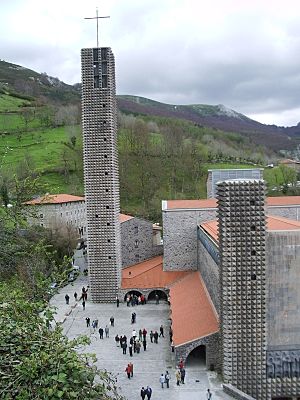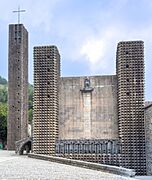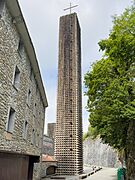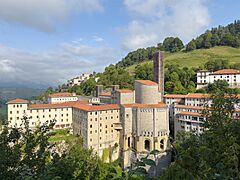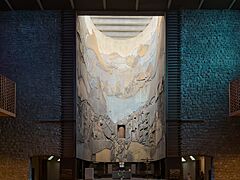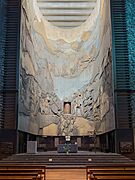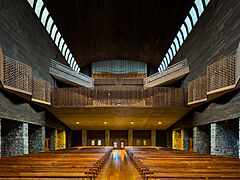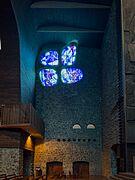Sanctuary of Arantzazu facts for kids
Quick facts for kids Sanctuary of ArantzazuArantzazuko Santutegia |
|
|---|---|
| Sanctuary of Our Lady of Arantzazu | |
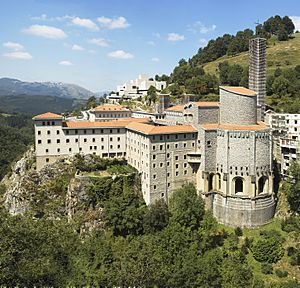
View of the Sanctuary
|
|
| 42°58′45″N 2°23′55″W / 42.97904°N 2.39854°W | |
| Location | Oñati, Gipuzkoa |
| Country | Spain |
| Denomination | Roman Catholic |
| History | |
| Authorising papal bull | 14th–15th century |
| Dedication | Virgin of Arantzazu |
| Architecture | |
| Completed | 1950s |
| Administration | |
| Diocese | Diocese of Donostia-San Sebastián |
The Sanctuary of Our Lady of Arantzazu is a special Franciscan church in Oñati, a town in the Basque Country, Spain. It's a very important and loved place for people from Gipuzkoa. The Virgin of Arantzazu is the patron saint of this area, along with Ignatius of Loyola.
This church is built where the Virgin of Arantzazu is said to have appeared to a shepherd named Rodrigo de Balanzategui in 1468. The story says the Virgin's image was found in a thorn bush. The shepherd was so surprised that he exclaimed, "Arantzan zu?!" which means "You, among the thorns?!" This exclamation gave the place its name. Another explanation for the name is that arantza means "thorn" and zu means "place abounding in," so it means "place full of hawthorn bushes."
In 1886, Pope Leo XIII officially recognized the image of the Virgin. The name Arantzazu is also a popular female name in Spain, especially in the Basque Country.
Contents
A Place of Peace and Beauty
The Sanctuary of Arantzazu is located high up in the Aizkorri mountain range. It's known for its quiet and peaceful atmosphere. Good roads make it easy for people to visit. Many pilgrims and tourists come here to enjoy the calm surroundings.
It's also a great starting point for hikers. There are well-marked trails that lead to beautiful meadows and other parts of the mountains.
The Story of the Name
The name "Arantzazu" is deeply connected to the legend of how the Virgin Mary appeared there. In the Basque language, "arantza" means "thorn," and the ending "zu" means "abundance." So, "Arantzazu" means "a place with many thorns," referring to the thorny bushes common in the area.
The most famous version of the legend comes from a historian named Esteban de Garibay in 1571. He wrote that a shepherd, Rodrigo de Balanzategui, found a small statue of the Virgin Mary holding a child. It was hidden in a thorny bush, next to a cowbell. When he saw it, he cried out, "Arantzan zu?!" meaning "You, in the thorns?!" This moment is believed to be the origin of the name.
The Sanctuary's coat of arms, designed by Padre Lizarralde, shows a thorn bush with a star blooming from it. This design is based on the famous legend.
The Modern Basilica
The current church building, known as the basilica, was started in 1950. It was finished and opened five years later. It's a very modern and impressive building.
Many famous artists helped design and decorate the basilica:
- Francisco Javier Sáenz de Oiza and Luis Laorga were the main architects.
- Lucio Muñoz created the large altarpiece.
- Jorge Oteiza made the sculptures of the Apostles.
- Eduardo Chillida designed the entrance gates.
- Nestor Basterretxea painted the crypt.
- Xabier Álvarez de Eulate created the beautiful stained-glass windows.
The Franciscan convent at Arantzazu has also been an important center for Basque culture. It helped keep the culture alive even during difficult times.
The main celebration at Arantzazu is the Virgin's feast day, which happens every year on September 9.
Arantzazu in the Philippines
A copy of the Virgin of Arantzazu, with the same title, was brought to the Philippines in 1705. This happened during the time when Spain ruled the Philippines. This particular image is special because it shows the Virgin standing.
In 2017, Pope Francis also officially recognized this Philippine image. It is honored at the National Shrine and Parish of Our Lady of Aránzazu in San Mateo, Rizal.
Gallery
See also
 In Spanish: Santuario de Aránzazu para niños
In Spanish: Santuario de Aránzazu para niños
 | Victor J. Glover |
 | Yvonne Cagle |
 | Jeanette Epps |
 | Bernard A. Harris Jr. |



